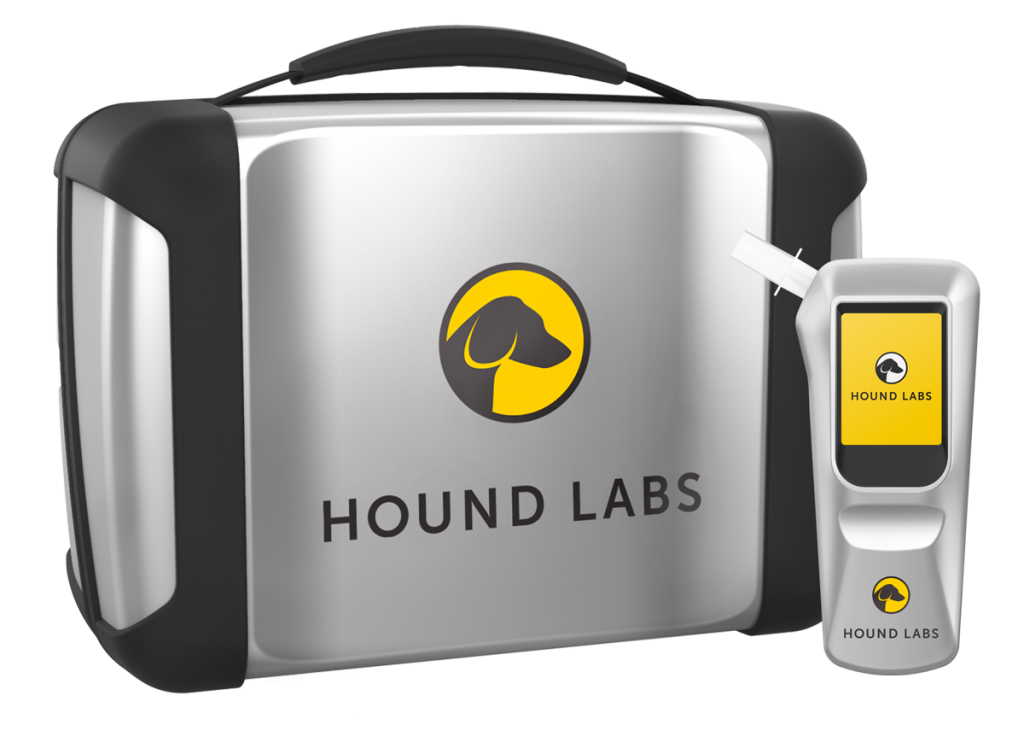
Hound Labs recently received $30-million in series-D funding for its marijuana breathalyzer product. The company touts its breathalyzer as “the world’s first dual marijuana and alcohol breathalyzer.” The funds will be used to boost manufacturing and availability of the product. If Hound Labs successfully ramps up production and its technology works as promised, this marijuana breathalyzer will have tremendous repercussions on the future of marijuana DUIs.
What Is the Hound Marijuana Breathalyzer?
The Hound Labs breathalyzer tests for both blood-alcohol concentration (BAC) and Tetrahydrocannabinol (THC) levels (the active metabolite in marijuana). It resembles a standard breathalyzer that’s used by many law enforcement agencies. According to Hound Labs, its product:
- Measures recent use regardless of how marijuana was consumed (smoked vs. eaten)
- Offers THC results within minutes
- Can detect a BAC range between 0.00 and 0.30 percent with a 0.005 percent margin of error
- Captures two samples at once—one for immediate testing and one for future testing
The Problems With Current THC Testing Methods
Arizona currently tests for drug DUIs in a number of ways. The first step in a marijuana DUI investigation is usually a field-sobriety test which allows police to look for any signs or symptoms of drug impairment. The results of those, however, are often disputed since they’re subjective and at the discretion of a law enforcement officer.
If police have probable cause for a drug DUI, chemical tests for marijauana can be performed, requiring the accused to surrender a saliva, urine, or blood sample. Analyzing those substances requires a lab, so the results are not instantaneous. This makes it possible for someone to be arrested for a DUI and charged later.
Furthermore, many things can go wrong between collecting the sample and getting it analyzed in a lab. The sample may be contaminated by foreign substances during collection or transport. Extreme temperatures can also taint the sample. Additionally, many current lab tests can effectively show that THC was in the accused’s system, but are unable to indicate how recently marijuana was used.
How Technology Can Change Drug DUIs
As noted in the section above, testing for marijuiana as part of a DUI investigation in Arizona is currently a lengthy process. Additionally, the use of field sobriety tests alone is often insufficient to prove impairment. The Hound marijuana breathalyzer potentially gives law enforcement agents a powerful tool against drug DUIs. Unlike field-sobriety tests, Hound Labs’ product is objective and purportedly backed by science. Unlike lab tests, the analysis is performed in a matter of minutes.
Technology like Hound Labs’ is hugely impactful. Law enforcement would have a fast and accurate way to test for THC in the field. On paper, this kind of technology would make drug DUI investigations resolve more quickly. However, it’s not yet known how reliable the technology is and how accurately it will be able to quantify the level of THC in a person’s system. Moreover, Arizona does not have any laws in place concerning a “legal limit” of THC a motorist or medical marijuana patient can legally have in their system while operating a motor vehicle. Such uncertainties are why it’s best to have the assistance of an experienced marijuana DUI lawyer when fighting a drug DUI case.
Contact a Drug DUI Lawyer
The criminal defense attorneys at Lerner and Rowe Law Group stay at the forefront of how police investigate DUIs, including the possibility of inclusion of the Hound Labs marijuana breathalyzer. However, it remains potential for now. Until the product is produced en masse and the technology is validated, Arizona will continue to test for marijuana DUIs as it currently does. As mentioned, many things can go wrong when you’re accused of a drug DUI. If you or a family member have been accused of DUI, let Lerner and Rowe Law Group assist you.
You can stop by the offices of Lerner and Rowe Law Group for a free consultation Monday through Friday between the hours of 8:00 a.m. and 5:00 p.m. We’re also available 24 hours a day, 7 days a week by phone at 602-667-7777 or online through our expedient LiveChat and form features. Don’t hesitate; contact us today.

